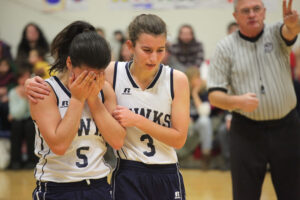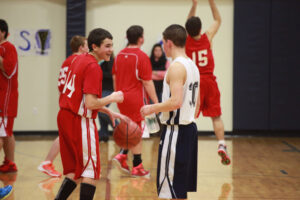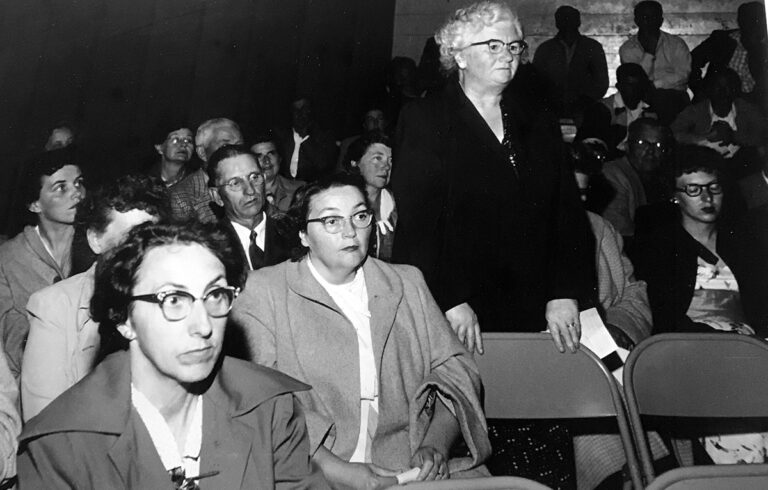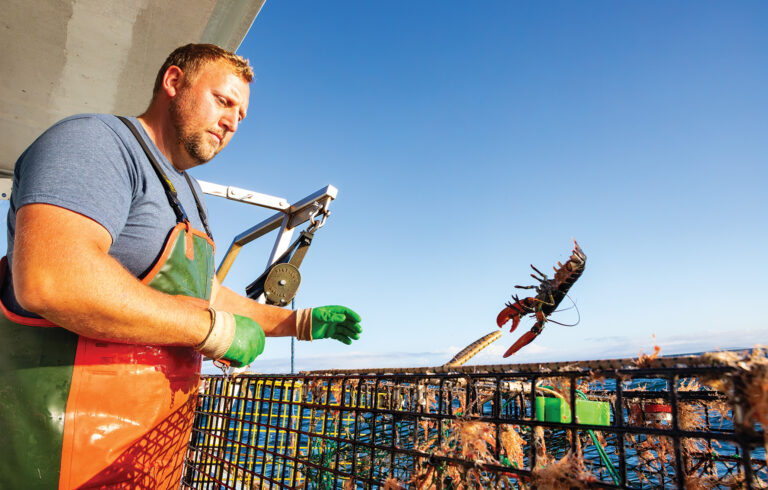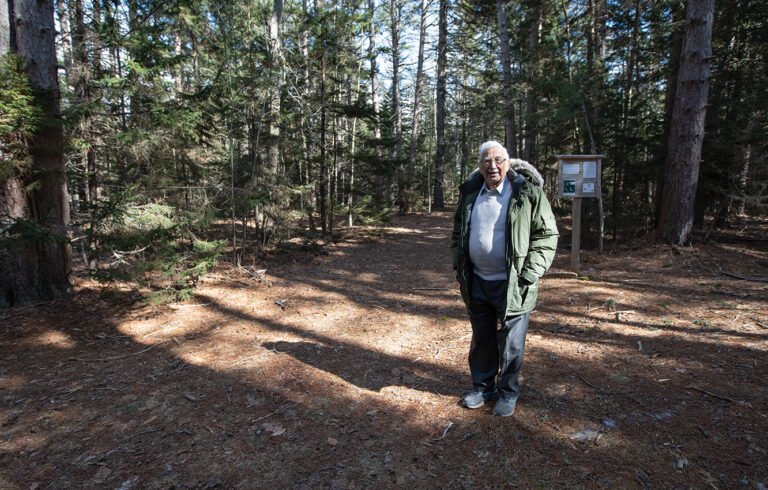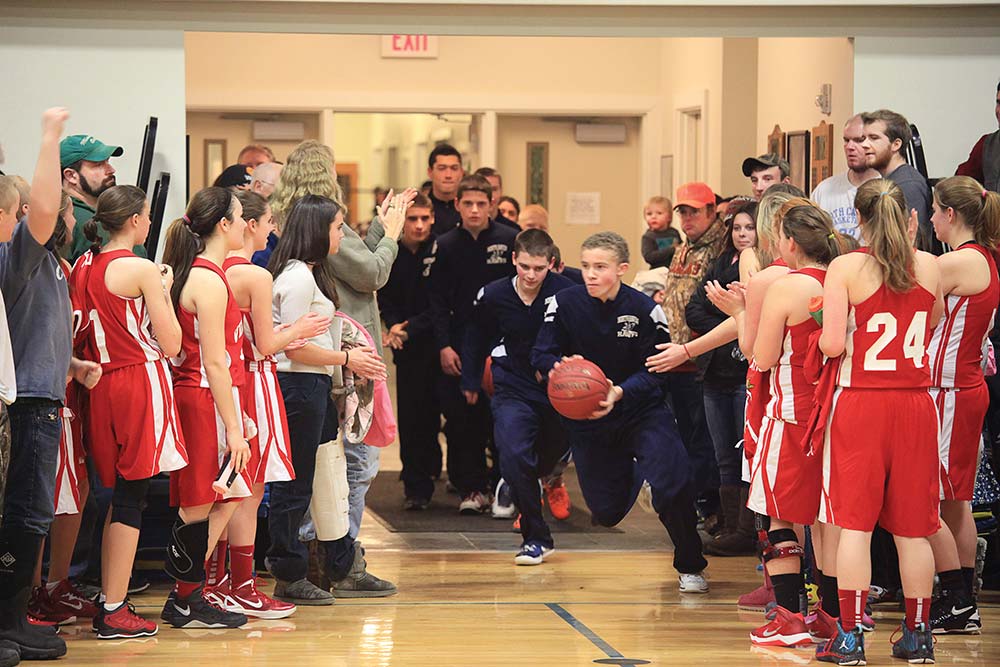
The water pipes on Vinalhaven have frozen.
Well, they may have frozen. No one really seems to know what happened, but an early January bitter cold stretch—daytime highs in single digits—has put some kind of hurt on the municipal water system. One explanation is that so many homeowners’ pipes have frozen and cracked, and now are leaking, that the system’s pressure dropped. Or maybe the main lines below the streets have frozen.
Either way, the home basketball game on Vinalhaven is now an away game on North Haven. In the course of an island winter, even one as brutally cold as this, the change doesn’t seem to be a big deal to anyone.
At about 4 p.m., Linda Crockett at J. O. Brown’s Boatyard on North Haven reminds Foy Brown and the crew that they’ve now got to cross the Thoroughfare to pick up the Vinalhaven teams—boys and girls—rather than shuttle the North Haven teams south to Vinalhaven. The word is that the Vinalhaven bus wouldn’t start, so transportation for parents and fans might be limited. But as it turns out, the bus does start, and those parents and fans will be transported by multiple trips on the lobster boat.
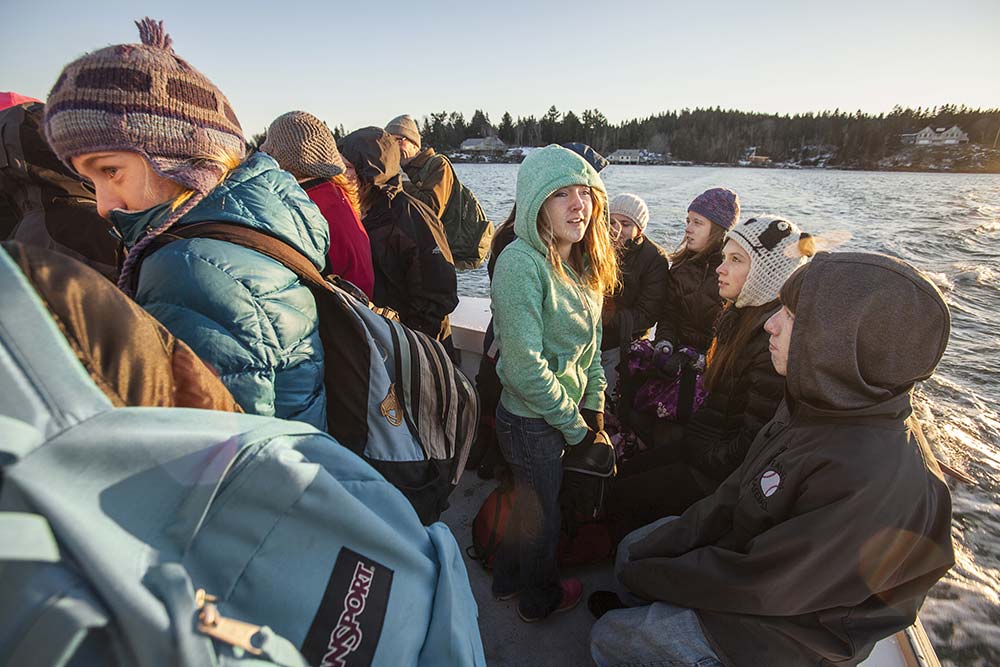
Foy Brown (better known as Little Foy) and his four-year-old son Cyrus climb into Foy’s lobster boat, and across the 500-yard span they go, picking up and packing in students and parents like sardines. Chivalry is alive; the girls’ team is shuttled across first. It’s a frigid trip, so there’s less goofing around than might be expected, though when the boys make the journey, some make wisecracks about some of the North Haven names on boats they see floating at their moorings.
The depth of winter finds many Mainers deeply invested in high school basketball. It’s got all the elements we look for in those cold, dark months—the drama of competition, the spectacle of entertainment, and the warmth of shared community experience and family ties.
On the islands, it’s the same mix of ritual and passion. Even with the island-unique logistics—who goes to an away game by lobster boat?—basketball is a familiar wholesome diversion, an unscripted play in which a community’s teens improvise; they sweat, twist ankles, leap and soar, succeed and fail.
Carolyn Augusto and her younger son M.J., 11, mingle at Waterman’s Community Center, where the Vinalhaven players and fans took refuge from the cold after the Thoroughfare crossing. They then board the bus to ride to the North Haven Community School.
Augusto explained that M.J. had suggested going to the game when it was still planned for Vinalhaven, and once the change was made, they—including older son Frank, 12—thought they might as well make the trip to North Haven.
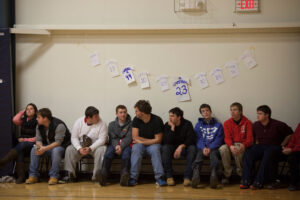
Augusto’s husband is a plumber on Vinalhaven, and was just getting home after a long, cold day working on frozen pipes when she and the kids headed off.
“We are a sports family,” she said. The boys play soccer, basketball, and baseball, and her husband helps coach Little League. While some parents grow to dread the long trips to away games, especially those in remote mainland towns, Augusto loves it all.
“I love the trips with the team, watching all the kids grow into great players,” she said, “and the team spirit that the island teams share. Plus it’s something we do as a family.”
TIP-OFF
There are no junior varsity or freshman teams in such small schools. In fact, the Maine Principals’ Association, which oversees school sports, makes a special exception for schools as small as North Haven’s and allows it to include eighth graders.
The girls’ game is first, starting at about 6 p.m. During the player introductions, each girl shakes hands with the opposing team’s coach and fist-bumps with the refs.
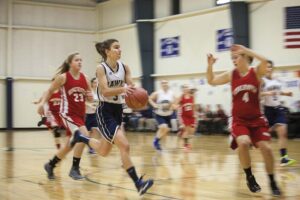
About 100 fans have packed themselves into the gym, filling the bleachers and overflowing into the corners. There is applause for the girls from both teams, though a roar greets the introduction of the North Haven team when it takes the floor.
The North Haven girls space the floor well, and seem to play out of a set offense. At the end of the first quarter, on a well-executed couple of passes, a North Haven girl hits a shot just as time expires. It’s 8–8.
But the Vinalhaven team, with more players, outworks the North Haven girls, swarming for rebounds, hustling for loose balls. They’re up, 23–13, at the half.
During the break, there’s lots of socializing.
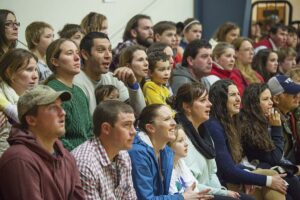
Nathan Hopkins, 21, of Vinalhaven is among those standing in a corner of the gym. Well over six feet tall, he looks like a basketball player, and is—or was, when he played for Vinalhaven. The intra-island rivalry isn’t what it once was, he explained.
“Over the last five years, it’s gone more to a friendly camaraderie,” he said. These days, kids from North Haven play soccer and baseball for the Vinalhaven school, because the smaller North Haven school doesn’t have the numbers to field teams for those sports, he explained.
Scott James, 19, also of Vinalhaven, graduated last year. He agreed with Hopkins that it’s just as likely for a North Haven player to get an encouraging shout at a game on Vinalhaven as it is here.
Dana Tolman of Vinalhaven, home on Christmas break from Maine Maritime Academy, is stopped by an adult who asks how he’s doing. Tolman introduces the man to his girlfriend, who’s from New Jersey and seems a little wide-eyed at the whole experience.
As play resumes, the North Haven girls make a valiant effort to stay in the game. Sportsmanship is ethic of the hour. But that doesn’t stop North Haven principal Amy Marx, who’s sitting courtside wearing a T-shirt that reads lady hawks, the team’s name, from throwing both her arms into the air when her team scores on a steal and a fast break.
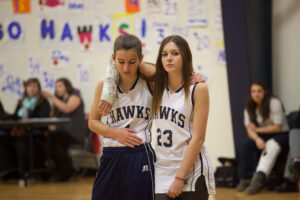
Late in the third, Maddie Hallowell, a standout point guard for North Haven, has to be helped off the floor, limping. But when the fourth quarter begins, Hallowell is back on the court.
The Vinalhaven Vikings prevail, 58–32. When the final buzzer sounds, Ashley Hamilton of Vinalhaven hugs North Haven’s Hallowell.
ROAD WARRIORS
The other games on the schedule are, in their own way, even more brutal, though not without their allure.
Cecily Pingree, 34, and Liz Lovell Bartovics, 29, are the first-year coaches of North Haven’s girls’ team. The nine girls who make up the team are not the school’s best; they are, in fact, all the girls in the school.
“We’ve got every high school girl except one eighth grader, and she’s the manager,” said Pingree.
The two women played for North Haven; Pingree is a 1997 grad, and Bartovics, an ’02 grad. Bartovics scored over 1,000 points in her high school hoops career, and Pingree came within a handful of points of clearing that threshold.
“We both love the game of basketball,” Pingree said, and both happened to be living on the island again when the job opened up. They decided to share the load.
Transportation during the winter months is a challenge for most high school sports teams. That challenge multiplies when the teams come from remote rural areas, and multiplies again when there’s a ferry involved. To ease the logistics, island teams alternate between “home” and “away” seasons. While Rockland and Camden might face each other in one school’s gym in December and in the other’s in January, island schools play their opponents back-to-back in one town.
The 2013–14 season for North Haven was an away season.
“Every weekend they ship us up there,” Pingree said of the journeys the team takes to places like Rangeley, up near the New Hampshire border in Western Maine, or in Jackman, near the Canadian border, or Greenville on the shore of Moosehead Lake. The trips are necessary because the state’s athletic leagues are organized by school size; North Haven, Vinalhaven, and Islesboro are in the smallest sector, Class D, and must travel distances to find like-size schools.
“Usually, we would just sleep on the gym floor,” she said, but at Rangeley, the host school put the boys’ team up at a large cabin and the girls’ team at another one. It was 14 degrees below zero that Saturday morning, but the players and coaches were toasty warm in the super-insulated cabins, she said.
“The Rangeley girls are notorious for being solid,” Pingree said, and that meant the North Haven girls lost both the Friday night (December 13) and Saturday morning (December 14) games.

The road trips bring back memories.
“I loved those trips to Rangeley,” Pingree remembered. “You’d get to interact with other kids.”
Back in the 1990s, visiting players stayed with the families of the host team. “It was really fun,” she recalled, but there were some bad experiences, with some teens feeling uncomfortable, and parents worried about what was going on in some of the homes, so the practice ended.
Still, there are lots of opportunities for social interaction, which is just the ticket for island kids in the depths of winter, Pingree said. Those long bus trips—three-plus hours to Rangeley, for instance—are good for chatting in a non-classroom setting.
And even seeing a different part of the state is stimulating and a diversion, Pingree added. Players are struck by the mountains, the different sorts of houses and stores. Even a trip to nearby Islesboro inspires observations about that island’s lack of a downtown, the different-size ferry.
Trips to those remote, rural areas also generate some bragging, or commiserating.
“There would always be a lot of humor about who was more rural,” Pingree recalled. Jokes would be made by islanders about North Haven not having running water or electricity, all in good fun.
These days, the coach will overhear her girls talking with opposing players in those hours between the night and morning games, asking teen-type questions: “So, what kind of music do you listen to? Do you have a car?” Internet-based social media has made the connections with other schools tighter. On the bus ride home from Rangeley, North Haven girls were “friending” the Rangeley girls on Facebook, Pingree said, and reading aloud some of the information they gleaned from those girls’ pages.
But it’s not easy. The teams practice two hours every day, then hit the road for those Friday-night, Saturday-morning games. These rigors can lead to players quitting. But, according to Pingree, the island teens seem to embrace the team, perhaps more than their mainland counterparts.
BOYS’ TURN
Back in the gym that cold night, the North Haven boys burst out of the hallway wearing tight, dark-blue warm-up suits and take the court, zipping around the floor in two concentric, opposing circles. They’re confident, all business. And there are only eight of them.
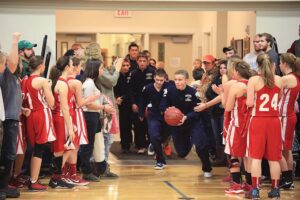
Vinalhaven takes the floor for warm-ups with 15 players.
Less than a minute into the game, Zeb Campbell of North Haven twists his ankle, badly, and has to be helped to the sideline. The gym falls silent. The Vinalhaven players take a knee until Campbell is off the court.
At the end of the first quarter, it’s North Haven up, 16–5.
Vinalhaven claws its way back, closing the gap to 16–10, then North Haven breaks it wide open, and it’s 39–16 at the half.
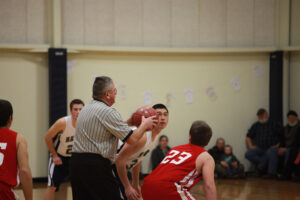
Two men near the baseline rib each other about the score, one rooting for Vinalhaven, the other for the home team. Another man slips outside to drink some schnapps, announcing his indiscretion to the others each time he returns. But it’s mostly a family-friendly affair.
Late in the game, a Vinalhaven boy who didn’t see any playing time is on the floor and hits an outside shot. Everyone roars. Then one of North Haven’s eighth graders, after missing a couple of three-point attempts, nails one. Again, the crowd roars.
The final score is North Haven, 83, Vinalhaven, 41.
Players, parents, grandparents, siblings, and others gather in the school lobby as a bus shuttles the Vinalhaven crew back to Waterman’s. At about 8 p.m., the Thoroughfare crossing is reversed, with some open skiffs helping to carry the student athletes and families across those cold waters. There’s a cry from a teen boy as one of the small boats lurches ahead: “We’re all gonna die!” But it’s more joy than fear.
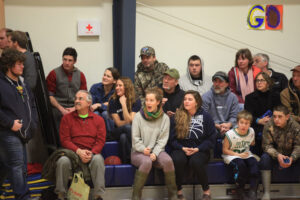
As unusual as this ritual is, as vividly as it pictures how boats and community cooperation are woven into island life, no one seems to acknowledge it as anything but routine.
The crystal-clear, starlit skies, the inky waters, the dry snow crunching underfoot, and the still-piercing cold create a convivial atmosphere, a festive camaraderie among the teens and adults headed for home. The Vinalhaven boys try out some singing on the ride back to the school, taking stabs at some radio staples from the ’90s. The loss doesn’t seem to have bruised them much.
TOURNEY TIME
It’s been a good year for island basketball. The North Haven boys made it to the Western Maine Tournament—the equivalent of statewide play-offs—the first time in memory. They won their first-round contest, but lost in the second. The Islesboro Central School boys also made the tournament, but lost in the first round. North Haven’s Avery Waterman, following in his father’s and uncle’s footsteps, cleared the 1,000-point scoring threshold. The milestone basket came in a game at Vinalhaven. The “away” crowd went wild, Waterman said.

